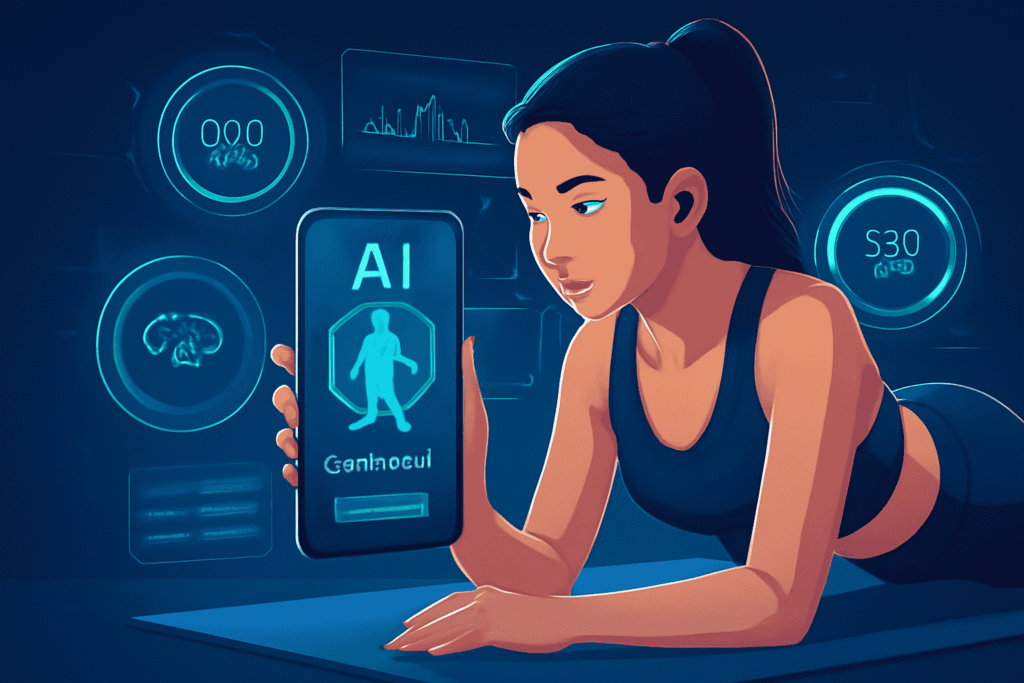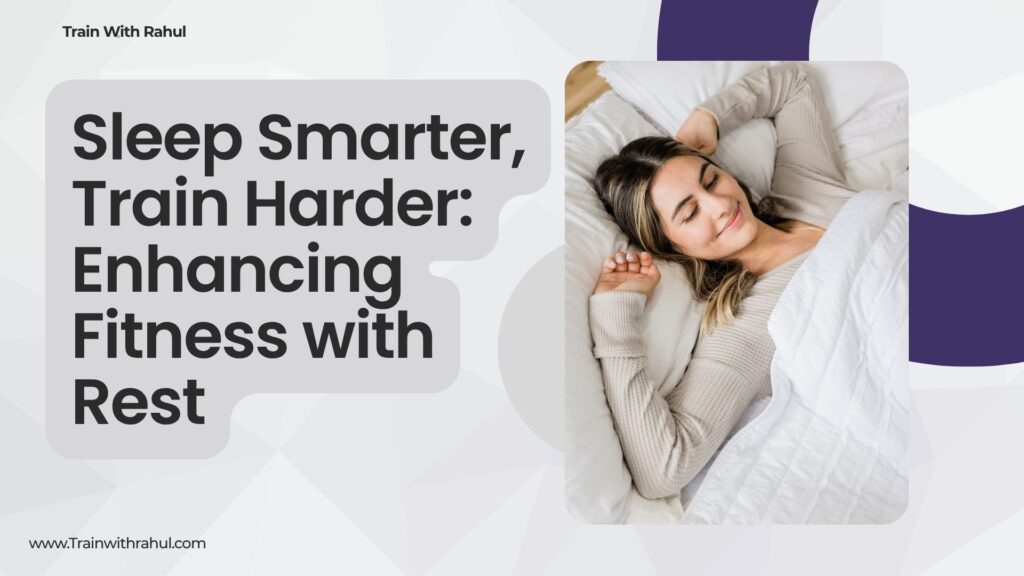In recent years, artificial intelligence (AI) has disrupted industries across the globe, transforming everything from healthcare to entertainment. Among the most exciting advancements is AI-powered workout plans in the fitness industry. With a growing demand for personalized workout routines, AI is stepping in to deliver customized fitness solutions that adapt to an individual’s fitness goals, current levels, and preferences.
The global fitness app market is estimated to grow by $55.86 billion from 2024 to 2028, driven by health management and rising chronic disease cases.
Fitness enthusiasts today no longer need to settle for one-size-fits-all training programs. With AI, fitness plans can be tailored specifically to the user, ensuring an optimal training experience and faster progress. In this article, we’ll explore how AI-driven fitness apps are reshaping the future of fitness training, the numerous benefits of personalized workout plans, and how AI technology is revolutionizing health and wellness practices.
What Are AI-Powered Workout Plans?
AI-powered workout plans use machine learning algorithms to analyze a user’s data and create a personalized fitness routine. This data can include details such as:
- Age
- Gender
- Fitness level
- Health status
- Available workout equipment
- Specific fitness goals (e.g., weight loss, muscle gain, or improving endurance)
The AI system continually analyzes the data, making necessary adjustments to the workout plan as the user progresses. For example, if a user starts lifting heavier weights or running longer distances, the AI will adapt the plan to ensure the workout remains challenging and effective.
In essence, AI-powered workout plans take fitness personalization to the next level by using data-driven insights to cater to each individual’s needs, resulting in an optimized training experience. These personalized plans are available through fitness apps, wearable devices, or smart gym equipment.
Some of the top AI-driven platforms use sophisticated algorithms to ensure that the workout plans are not only efficient but also time-effective. Thanks to these advances in AI, fitness enthusiasts have access to training methods that were once exclusive to professional athletes.
Benefits of AI in Fitness
Approximately 78% of personal trainers are utilizing AI to create customized workout plans, enhancing client engagement and results.
AI is transforming the fitness industry by offering a wide range of benefits. From personalized workout plans to real-time adjustments, here’s a closer look at how AI is changing the way we approach fitness.
1. Tailored to Your Unique Needs
One of the most significant advantages of AI-powered workout plans is their ability to tailor workouts to an individual’s unique needs. Traditional, one-size-fits-all fitness programs may not take into account your personal fitness level, body type, strengths, weaknesses, injuries, or preferences. However, AI algorithms use data to create workout routines that align with a person’s fitness goals.
Whether you’re a beginner looking to shed a few pounds or an elite athlete training for a competition, AI-powered fitness apps adjust the workout plan based on your current fitness level and resources. This personalized approach reduces the risk of overtraining and undertraining, ensuring you make steady progress toward your fitness goals.
For example, a user trying to gain muscle mass will receive strength-focused exercises, whereas someone looking to improve cardiovascular health will be given endurance-based activities. This level of personalization not only improves efficiency but also helps avoid the common mistake of following a generic workout plan that doesn’t suit your body or goals.
2. Real-Time Adaptation and Progress Monitoring
AI-powered fitness plans are dynamic. As the user progresses, the AI constantly analyzes performance data and adjusts the workout routine accordingly. This ensures that users are consistently challenged and continue to make progress.
The system monitors a range of metrics such as:
- Heart rate
- Calories burned
- Exercise form
- Muscle groups targeted
- Reps and sets completed
For example, if a user begins increasing the number of repetitions or the amount of weight they’re lifting, the AI will make real-time changes to ensure they’re still being appropriately challenged. Similarly, if a user is experiencing a plateau or is struggling with a particular exercise, the AI will modify the workout plan to either intensify or ease up on specific exercises.
This adaptability makes AI-powered fitness apps more effective than traditional workout routines, which may not take progress into account. The real-time feedback also allows users to fine-tune their exercises and maximize results, avoiding the dreaded stagnation many experience in their fitness journeys.
3. Time Efficiency
In today’s fast-paced world, time is a valuable resource. Many individuals struggle to find the time for long, grueling workouts, and as a result, they often skip sessions. AI-powered fitness apps understand this and are designed to deliver maximum results in the shortest time possible.
AI-driven workout plans suggest time-efficient exercises such as:
- High-Intensity Interval Training (HIIT)
- Circuit training
- Bodyweight exercises
These types of workouts target multiple muscle groups simultaneously, allowing users to get the most out of a limited amount of time. AI algorithms also take into account how much time a user has available for exercise. For instance, if you only have 20 minutes, the AI will tailor the workout to fit that timeframe without compromising on effectiveness.
4. Accessibility and Affordability
Traditionally, personalized fitness plans required a one-on-one session with a personal trainer, which could be expensive and difficult to schedule. With the advent of AI-powered fitness apps, personalized fitness training is now accessible to anyone with a smartphone or wearable device.
Platforms like Peloton, Freeletics, and Jefit offer affordable subscription plans for users to access personalized workouts, eliminating the need for pricey gym memberships or personal trainers. This accessibility is helping to democratize fitness, making personalized training available to people from all walks of life.
Furthermore, as AI systems are designed to work with a variety of devices—smartphones, wearables, and even smart gym equipment—users are not limited to traditional gym settings. Whether you’re at home, at the gym, or on the go, AI fitness apps ensure you can access personalized training anytime, anywhere.
5. Data-Driven Insights
AI systems excel in data collection and analysis. As users progress through their fitness routines, the AI collects detailed data about their performance. This data-driven approach provides valuable insights into strengths, weaknesses, and areas for improvement.
For example, AI can track which exercises are producing the best results, helping users focus on movements that offer the most benefit. Similarly, AI can identify areas where users may be struggling and suggest adjustments to improve form, reduce risk of injury, or increase workout intensity.
Additionally, AI can integrate data from wearables such as heart rate monitors, smartwatches, and fitness trackers, providing a holistic view of your overall fitness and health. With AI, users have a comprehensive fitness dashboard that they can use to make informed decisions about their workout routines.
Leading AI-Powered Fitness Platforms
The AI-driven fitness revolution is here, and several platforms have emerged at the forefront of this transformation. Here’s a look at some of the most prominent AI-powered fitness apps:
1. Peloton
Peloton is a household name in the fitness industry, and the company has embraced AI to enhance its workout offerings. By integrating AI into its platform, Peloton personalizes workouts for users based on their fitness goals, preferences, and current fitness levels. Peloton’s AI features also offer dynamic workout suggestions and real-time feedback to optimize performance.
With its vast library of live and on-demand classes, Peloton offers a hybrid fitness experience, combining the benefits of AI-driven routines with human-led instruction. Peloton’s classes are designed to keep users motivated, whether they’re cycling, running, or participating in strength training sessions.
2. Freeletics
Freeletics is a popular AI-powered fitness platform known for its bodyweight-based workout plans. It uses machine learning algorithms to generate personalized workout plans that cater to the user’s fitness level and goals.
Whether you’re at home, at the gym, or on the go, Freeletics provides users with a range of bodyweight exercises that don’t require equipment. The platform adapts workout intensity based on the user’s performance, ensuring that the user is always challenged, no matter their fitness level.
3. Jefit
Jefit is an AI-powered fitness app designed to track users’ performance and suggest workouts tailored to their needs. The app offers a massive database of exercises and detailed tracking metrics. With the AI-powered coach, Jefit helps users improve their form, avoid injuries, and progress toward their fitness goals.
Jefit also integrates advanced metrics tracking, including sets, reps, weight lifted, and workout duration, helping users fine-tune their routines and achieve optimal results.
4. Future Fit
Future Fit combines AI with personal coaching, offering users a hybrid experience. The platform provides AI-generated fitness plans but also allows users to connect with real-life coaches for additional guidance and motivation. This combination ensures that users have the best of both worlds: the efficiency of AI and the human touch of personal coaching.
Future Fit’s AI system evolves as the user progresses, adjusting the workout plan based on performance data, while coaches provide personalized feedback, ensuring users stay on track to reach their fitness goals.
Challenges of AI-Powered Workout Plans
While the benefits of AI-powered fitness plans are clear, there are also challenges to consider when integrating AI into workout planning.
1. Data Privacy Concerns
AI-powered fitness apps rely heavily on personal data to create tailored workout plans. This reliance on data raises privacy concerns, particularly when sensitive information such as fitness levels, body measurements, and health conditions are shared with third-party apps.
To mitigate these risks, it is crucial for users to choose platforms with robust data protection policies. Reputable AI fitness platforms use encryption and secure storage measures to protect user data. Users should also be mindful of third-party integrations, as data sharing between different apps could increase privacy risks.
2. Over-Reliance on Technology
While AI can create personalized workout plans, it cannot replace the value of human coaching. Many users appreciate having a personal trainer to provide real-time guidance, adjust exercises based on body mechanics, and offer motivation during tough workouts.
Although AI can be incredibly effective, it may not be able to provide the same emotional connection and support that a live coach offers. As such, a balance between AI-driven solutions and traditional coaching may be necessary for some individuals to reach their full potential.
3. Algorithm Accuracy and Reliability
AI algorithms are only as good as the data they receive. Flawed or inaccurate data input can lead to suboptimal workout plans. Additionally, outdated algorithms may fail to incorporate the latest research in exercise science, which could result in ineffective workouts or even injuries.
To ensure that the algorithms continue to produce accurate results, AI fitness platforms must regularly update their algorithms with the latest fitness research and user feedback.
The Future of AI in Fitness
As AI technology continues to improve, we can expect even more exciting developments in the world of fitness. Here are some of the most promising possibilities for the future of AI-powered fitness plans:
1. AI-Driven Virtual Personal Trainers
In the future, AI could evolve to the point where virtual personal trainers are capable of offering live coaching and making real-time adjustments based on user performance. These virtual trainers will be able to provide feedback on form, technique, and progress, making personalized coaching more accessible and affordable.
AI facilitates the creation of virtual fitness communities, promoting accountability and engagement through personalized challenges and wellness coaching.
2. Integration with Nutrition and Wellness
AI could also play a key role in providing a more holistic approach to health by integrating fitness routines with personalized meal plans, hydration schedules, and even stress management strategies. With AI taking care of the entire wellness journey, users could experience better results and a more balanced lifestyle.
3. Seamless Integration with Wearables and Smart Equipment
The future of AI in fitness will see seamless integration with wearables, smart gym equipment, and virtual reality platforms. These innovations will provide real-time feedback and adaptive workout routines that adjust instantly based on a user’s performance.
Conclusion
AI-powered workout plans are ushering in a new era of personalized fitness. By harnessing the power of data, AI is able to deliver customized, time-efficient, and effective workout routines that help users meet their fitness goals more quickly and efficiently.
Whether you’re an amateur gym-goer or a seasoned athlete, embracing AI-powered fitness technology can significantly improve your workout experience. As AI continues to evolve, we can expect even more sophisticated and dynamic fitness solutions that help people achieve their health and wellness goals.
By integrating AI into your fitness routine, you’re not just following a random workout schedule — you’re engaging in a data-driven, personalized fitness journey that adapts to your needs and evolves with you. So, whether you’re looking to lose weight, build muscle, or simply maintain a healthier lifestyle, AI-powered fitness could be the key to unlocking your full potential.


